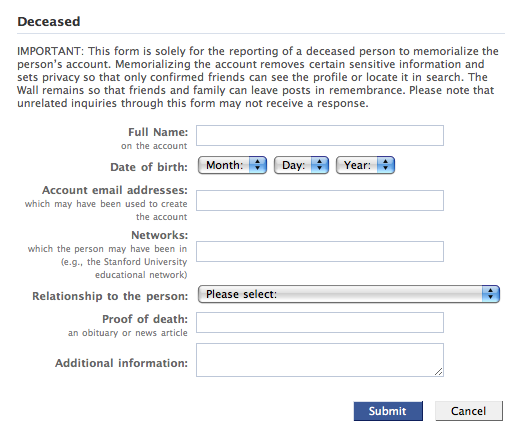Evidence of death

Increasingly, users of social networks receive messages and notifications from deceased people. It scares someone, someone is upset because of the surging memories of a departed person, but no one is indifferent.
The largest social network Facebook and many others are designed in such a way that users receive automatic notifications, for example, about friends' birthdays, significant events, etc. And network owners are faced with the problem of automating the determination that a particular user has died.
Facebook is trying to fight the "ghosts" on its network, but they admit that they have not found the optimal solution to this problem. “This is a very sensitive topic,” says company spokeswoman Meredith Chin, “Of course, getting pop-ups from dead friends can be painful. And given the size of the site and the fact that people die every day, we most likely will never be perfect in this direction, ”she added.
James Katz, a professor at the Department of Communications at Rutgers University, said the company was in its infancy, as at the very beginning of the existence of networks, users were mostly young and deaths were rare and often tragic.
Now, people over 65 years of age are registered on Facebook much more often than people from any other age group. And given that the mortality rate in this age group is one of the highest in the world, the problem is only getting worse.
Some people are not opposed to reminders of “departed” friends and relatives, and this is often an occasion to recall the deceased once again, to look at his photo, but sometimes, especially when someone died recently, his friends have a hard time. Nevertheless, many people consider receiving messages from deceased people a little creepy.
Facebook's approach to the death of its users is evolving over time. Previously, they immediately deleted the profile, having received confirmation of the death of its owner. Now, the company recognizes the importance of finding a suitable way to keep these pages as places where people can mourn the deceased. By popular demand, the company provided the opportunity to convert user profiles into virtual memorials. On these pages, some personal information is deleted and this profile will not appear in the search results. At the same time, grieving friends will still be able to post on these pages.
Of course, the company still needs to determine if the user is really dead. And the company is looking for ways to attract users or their computers to this process to help in this work. The system cannot always make the right decision about the death of a user automatically. One solution seems to be organizing a place where users could report the death of a loved one, which Facebook does. To perpetuate the profile, a family member or friend must fill out a form on the site and provide evidence of death, such as a link to an obituary or news, where Facebook employees could read about the tragic event.
But not many people know about this opportunity, and therefore many pages are not converted to memorials and messages from dead users continue to run through friends. And now we are considering the introduction of software that will scan messages from friends, and when messages appear that may indicate the death of a person, for example, “rest in peace”, “we miss you”, etc., send someone then from employees to confirm the fact of death.
Of course, this approach leaves moves for manipulating the death status, and there have already been cases when users joked about users' accounts, and then they had to prove for a long time that everything was fine with them and return everything as it was.
Facebook is thinking about this and other problems and trying to make sure that they can be completely avoided. But death, unfortunately, is inevitable, and social networks must find a way to integrate this aspect into the functional most painlessly. Social networks should not be the bearers of bad news, but nevertheless must take care of those who live memories.
A source
